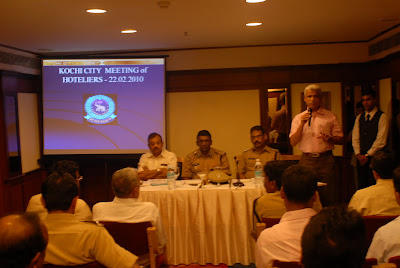
The two-day Global Community Policing Conclave organised by the Kerala Police in association with the International Police Executive Symposium (IPES) was inaugurated by Union Home Minister P. Chidambaram on 03.11.2010 at Kochi City.
Major speakers in the two day sessions included David W. Purdy, senior police advisor for the Department of State, U.S.; Arie Van Sluis, assistant professor at Erasmus University, Rotterdam, The Netherlands; Habil Emil W. Plywaczewski, professor and director, chair of Criminal Law and head of Division of Penal Law and Criminology, University of Bialystok, Poland; Michael M. Berlin, Assistant Professor of Criminal Justice, Coppin State University, U.S. Dilip K. Das, founding president of the International Police Executive Symposium (IPES); Sami Nabhan, head of the Service and Operations Section, and General Mounir Chaaban, head of the Training Section, Internal Security Forces, Lebanon; Muji Diah Setiani, assistant superintendent, and Am Sri Sudaryani Wahyuni, Interpol Police Inspector, Jakarta; Aleksandar Kostovski, International Rule of Law officer, Macedonia; and Shafiullah Walizada and Abdul Gheyas, Interpol Wing, Interior Ministry, Afghanistan, were the other speakers at this session.
Speaking on the first day of the Global Community Policing Conclave 2010, Nicholas Parker, management consultant on Community Safety and Criminal Justice Sectors, United Kingdom, said the community policing experiment in the U.K., which began in the seventies lost momentum after some time. This had to be revived recently.
He made a talk on ‘evolution of community policing in England and Wales' at the first session, which was about ‘historical development of COP'. Dr. Richard H. Ward of the University of New Haven, U.S., made the keynote address on ‘Community Policing: Its relevance today”.
The next session had some interesting moments as police officials and administrators from Afghanistan shared their experience. The theme of the session was ‘comparative COP theory and practice: Varieties of Communities'. The tone was set by Tonita Murray, senior advisor, Ministry of Interior, Afghanistan, with her talk titled “The Elephant, the Mouse and the Ant chase – an Afghan phantom COP'. She chaired the session.
In his address, Mustaq Rahim, Assistant Country Director, United Nations Development Project, said the police need to be civilianised and there was a need to build public awareness on police's traditional roles.
Other speakers in the session were Ahmad Zaki, UNDP Afghan project coordinator; Adbul Basir Yosufi, policy advisor and team leader, Ministerial Policy Unit, Ministry of Interior, Afghanistan; and Doel Mukherjee, consultant, Democratic Policing, UNDP Afghanistan.
Aswhani Kumar, Director of the Central Bureau of Investigation, chaired the next session, which was the second in the series of Comparative COP Theory and Practice that focussed on ‘convergence between East and West'.
Speaking about ‘community policing as a tool in combating terrorism', former Director General of the National Investigation Agency and former Special Director General of Police, Jammu and Kashmir Radhavinod Raju said that formation of Village Defence Committees helped a lot in organising the local communities against terrorists.
The local communities were often used by the terrorists as a cover for insurgency or as observation posts along the border, he said.
In his address, Hermanprit Singh, Inspector General of Police, West Bengal, said that often non-combatants are caught between coercion by militants and distrust by police. Other challenges in policing conflict areas are doing proper impact analysis and risk averseness, which amounts to neglect of core policing.
Ashok Dohare, Director General of Police, Madhya Pradesh; T.K. Vinod Kumar, Deputy Director, SVP National Police Academy, Hyderabad, and Arvind Verma, of Indiana University, Bloomington, USA, also made presentations on various aspects of community policing.
Summing up the session, Tejdeep Kaur Menon, Additional Director General of Police, Andhra Pradesh, observed that community policing should not be made an excuse not to do regular policing. If it so happens, the movement should be wound up without it ending up as a sham.
Chief Minister of Kerala Sri. V.S. Achuthanandan inaugurated the valedictory session on 04.11.2010. Union Minister of State for Home Sri. Mullappally Ramachandran, Home Minister of Kerala Sri.Kodiyeri Balakrishnan and the Director General of Kerala Sri.Jacob Punnoose IPS attended the valedictory session.





 JANAMITHRI AMBULANCE & SEWING MECHINS
JANAMITHRI AMBULANCE & SEWING MECHINS














